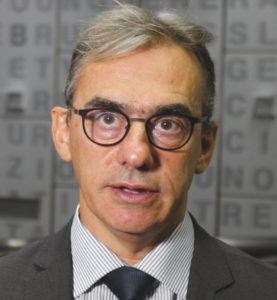
Marco Ventura is Professor in the Department of Law, University of Siena and Director of the Center for Religious Studies at Foundation Bruno Kessler
The pandemic has amplified the already existing challenge to the modern construction of religion as separate from science (and medicine, health and well being in particular), the economy and the public sphere (society, politics, government, etc.). Whatever the topic and the region, and whoever the speaker, our webinars have constantly and systematically exposed such challenge in its multifaceted reality. As we have been experiencing disease and death, failures and achievements, fragility and strength, we are brought to realize better than before that the re-articulation of religion and science, religion and the economy, and religion and politics is a global challenge, with multiple, and sometimes conflicting trajectories and variations. The transition from the crisis in global health to the crisis in the global economy is only going to broaden and dramatize the challenge. Hence the responsibility for experts and actors, for religious leaders and their communities, to work for better knowledge and for better action.
A specific lesson to learn from the debate and tensions around Covid-19 based restrictions and discrimination impacting on believers and religious or belief communities concerns the need for a deeper conversation on human rights, and especially on the dialogue between freedom of religion or belief and other human rights. Statements about the lack of conflict between freedom of religion or belief and other human rights in the ideal world of interdependent, interconnected, indivisible and interrelated human rights can be very misleading when it comes to properly manage reality. As we engage in a global exchange, we need to be aware of the importance of contexts in the rise and development of discussions and conflicts within religious communities (in particular over the alternative between flexible adaptation of practice – going online and moving to digital religion and inflexible rejection of relativized precepts and rituals) and between religious communities, the civil society and the government.
In my opening statement during our first webinar I have emphasized the importance of both knowledge and action, and I invited to make an effort in both directions. Our webinars have contributed a great deal in this direction, and yet a lot more needs to be done, especially as it comes to connecting experts and actors in view of a deep dialogue and cooperation. While myself pointing at the sacralisation of doctors and nurses as crucial and heroic in the struggle, much more than priests and nuns[1] the pandemic does not warrant any simplistic and absolute conclusion about the final victory of science over religion, or vice-versa. The challenge of knowledge and the challenge of action are about a whole new re-articulation of science, technology, religion or belief, and re-definition of their porous borders.
As we end this webinar series, the religion and innovation project at Fondazione Bruno Kessler (see our 2019 position paper[2]) is entering in the second half of the 2019-2021 strategic plan[3] . We have just submitted (in June 2020) a document to the European Commission responding to the public consultation on artificial intelligence where we emphasize our approach to religious or belief communities as fundamental actors in the European and global effort towards sustainable development.[4] The document was prepared during our webinar series and was strongly influenced by the presentations and discussions of our speakers. As our eight projects are further developed, we will run a webinar series on religion and artificial intelligence from September 2020, which will lead us through 2021 in the preparation of a policy paper on religion and AI by the end of 2021. At the same time, the interdisciplinary department of excellence DISPOC at the University of Siena will further work on religious diplomacy, religious diversity and religion and communication.
[1] See ‘The coronavirus pandemic has exposed fissures within religions’, Economist, April 11th 2020 edition.
[2] ‘Religion and Innovation: Calibrating Research Approches and Suggesting Strategies for a Fruitful Interaction, Position Paper of the Center for Religious Studies, Foundazione Bruno Kessler.
[3] Religion & Innovation: Gearing up for the AI Revolution, Strategic Plan 2019-2021.
[4] Engaging Religious and Belief Actors in the European Approach to Artificial Intelligence: Response of the Center for Religious Studies of Fondazione Bruno Kessler to the European Commission’s Public Consultation on the White Paper ‘On Artificial Intelligence – A European Approach to Excellence and Trust.’
